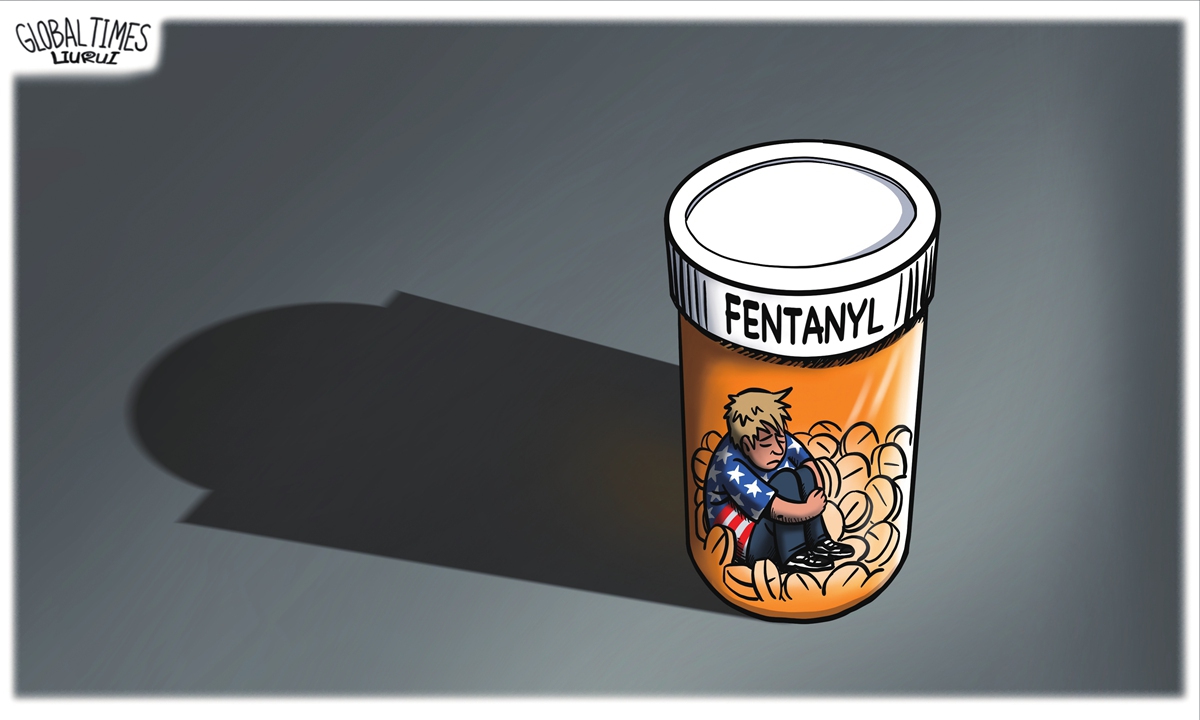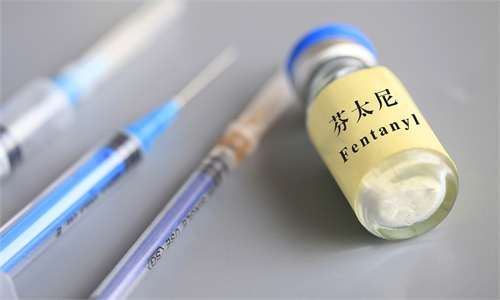
Illustration:Liu Rui/GT
Not long after the US Secretary of State Antony Blinken mentioned in Beijing that the two countries "need much greater cooperation" to solve the fentanyl issue, the US Department of Justice charged Chinese individuals "related to fentanyl problems" that were ensnared through US' "sting operation" in a third country, putting on a very typical US show of smearing and attacking China while asking China to cooperate.On June 23, the criminal charges were filed by the US Department of Justice against four Chinese chemical manufacturing companies and eight individuals "over allegations they illegally trafficked the chemicals used to make fentanyl." It is a landmark event in US hyping up the fentanyl issue and "playing the fentanyl card" for some time. From unreasonable sanctions against Chinese agencies responsible for anti-drug work, to smearing and illegal sanctioning Chinese enterprises, then the malicious "sting operation" and the criminal charges this time, US' unilateral acts of buck-passing and blaming external factors for internal diseases as well as its use of long-arm jurisdiction are increasingly seen as having no bottom line.
Some US media also hyped up that the US is "sourcing fentanyl precursor chemicals from China," trying to put the label of "drug trafficker" on China, the country with the most severe crackdown on drugs in the world. This kind of hype is sinister, but also very amateurish. The "fentanyl precursors" mentioned by the US side are actually chemicals that can be involved in the production of fentanyl, but they are ordinary commodities that are not controlled under international drug conventions and Chinese law, and the products previously sanctioned by the US side even include ordinary medical molds such as capsule filling machines. It's like when there is a mass shooting in the US, instead of looking for the cause within itself, the blame is placed on countries that export steel. Does sanctioning companies that export steel mean that there will be no more shootings in the US?
The US is known to have the worst drug problem in the world. 12 percent of global drug users come from the country, three times the proportion of the US population to that of the world. The US Centers for Disease Control estimates that fentanyl caused about 110,000 American deaths in 2022 and is currently the leading cause of death for Americans ages 18 to 49. Why is it that with 5 percent of the world's population, the US consumes 80 percent of the world's opioids? Why does the US fentanyl problem continue to worsen despite increasingly tighter international controls?
Faced with the unprecedented problem of drug abuse worldwide and the rampant drug trade and drug use in many parts of the US, it is clear to anyone with common sense where the problem lies. However, Washington politicians are still eager to blame others for their own dereliction of duty, especially targeting China as a "scapegoat" for their own indulgence in drug abuse. This approach is domineering.
It should be noted that due to the painful memory of the Opium War, China is the country in the world that hates drugs the most and is also one of the most effective countries in combating drugs. In fact, Chinese people are not familiar with "fentanyl." In 2019, the Chinese side, in a humanitarian spirit, took the lead globally in officially scheduling fentanyl substances as a class, though there was no large-scale abuse of them in China. This did a big favor to the US, which is deeply mired in the "fentanyl crisis." But what was the "return" from the US? In 2020, the US used the so-called "human rights issues in Xinjiang" as an excuse to sanction institutions such as the Physical Evidence Appraisal Center of the Chinese Ministry of Public Security and the National Drug Laboratory. Since these institutions play an important role in combating fentanyl, this illegal sanction is undoubtedly a pit dug by the US for itself.
It should be pointed out that, like the issue of gun control, the drug problem is also known as an "American disease" that is difficult to cure. Its emergence, development, and becoming a chronic disease are closely related to America's management, culture, and social division. In today's America, the Republican Party advocates for guns while the Democratic Party advocates for drugs, which is a dominant political culture. Specifically regarding the issue of fentanyl, the US government's overall leniency toward drug offenses, the over-prescription of psychiatric drugs by medical groups, and the lack of border control and domestic monitoring and tracking capabilities all contribute to the proliferation of drugs in America. These are the true underlying causes of the drug abuse in the US. However, from the Obama administration to the Trump administration and now to the Biden administration, they have not faced or been able to solve this problem well. They turn a blind eye to the circulation and trading network of fentanyl and other drugs in the country. Instead, they want to shift the blame on China to give domestic audiences an irresponsible explanation.
It should be said that while the "American disease" of drug abuse is difficult to cure, there are solutions. What Washington urgently needs is a multi-pronged approach, focusing on cracking down on domestic drug trafficking networks and seeking solutions through international multilateral cooperation. Unfortunately, compared to the tangible "American disease" of drug abuse, the intangible "American disease" of abnormal mentality toward China is even more difficult to cure. This once again shows the world how, under the "blame China for everything" culture, Washington politicians are shifting the attention of the American people by fabricating false China-related issues, and how they are gradually turning the oasis of cooperation between China and the US into a desert under the primary goal of "everything must serve the competition with China."

